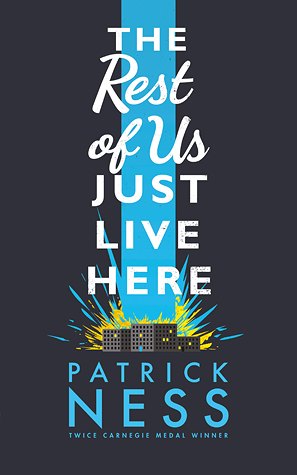There is something truly delightful about Patrick Ness’s stories. They’re good examples of how young adult literature can outshine adult literature, focusing around one brilliant idea rather than trying to cram as many into one story as possible. Not that I’m saying all YA stories do this nor that all adult literature don’t, but young adult literature seems to have less baggage when compared to adult books.
The Rest of Us Just Live Here is particularly brilliant. The story revolves around Mikey during his last few weeks of high school, struggling with a difficult home life, desperate to spend as much time with his friends before they all disperse after school, and trying to figure out what his future will hold. The characters are wonderfully depicted. Mikey who’s anxiety causes him to get stuck in loops (like washing his hands over and over and over again). His older sister Mel is still managing an eating disorder that forced her to miss a year of school ( and almost killed her) and his younger sister Meredith, the normal one in the family, is already missing her siblings who intend to leave home for college. Jared is Mikey’s gay best friend and on the way to being a crazy cat lady (or crazy cat god) and Henna is Mikey’s crush yet come the summer break she’ll be heading to a war torn country with her missionary podiatrist parents. Already sounds pretty awesome, right? It gets better. In the background, while Mikey and his friends are focused on going to prom and graduating, a mysterious blue light appears around town and indie kids are turning up dead. It’s not the first time something weird has happened in their town. There was that thing with the zombies, and those vampires, and way back when there were gods…
This story is told from the perspective of Mikey, the unchosen one. Unlike most urban fantasy, SF, Buffy the Vampire Slayer stories, all the bizarre stuff happens to someone else and Mikey and his friends are only caught up in the periphery. Kind of like China Mieville’s Un Lun Dun, the main character isn’t destined to be a hero. Mikey isn’t foretold or marked as special, and the short paragraph at the beginning of each chapter that outlines the Chosen One’s actions (a girl named Satchel) is wonderfully tongue in cheek. The underlining message is that not everyone has to be a hero to be important.
At one point, Jared explains this to Mikey:
“Not everyone has to be the Chosen One. Not everyone has to be the guy who saves the world. Most people just have to live their lives the best they can, doing the things that are great for them, having great friends, trying to make their lives better, loving people properly. All the while knowing that the world makes no sense but trying to find a way to be happy anyway” (236).
There should be more stories like this one. Go read it.

